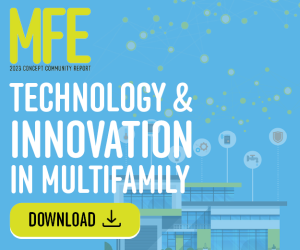
While the coronavirus pandemic kept Americans at home and away from friends and relatives, many have discovered the joy of the Zoom happy hour.
It may not be quite the same as sitting next to or across the table from loved ones, but having a drink with them during a video chat has been a great way to fight off loneliness, bridge the social distance, and feel connected in the COVID-19 era.
In the apartment industry, Zoom specifically and video-call technology, in general, have been lifesavers as well. Through these tools, operators have been able to keep leasing to new residents while also hosting online events that enrich the lives of their current residents.
Make no mistake: Video-call technology is vital to the health of your apartment portfolio in the COVID-19 era.
Connecting with Prospects Over Video
In a normal market, the in-person tour is such an important part of the apartment-shopping process for most prospective renters. It gives them a chance to experience a community for themselves. These visits also provide leasing associates with a chance to bond with a prospect and form the kind of relationship that moves a lead down the demand funnel.
With in-person visits now limited, operators have turned to Zoom and similar solutions to talk with prospects and provide virtual tours. While associates might find these calls a little awkward at first, team members can be quickly trained to thrive in this new reality.
Joe Melton, vice president of marketing and management support services at The Morgan Group, says one of the most important steps is to coach leasing associates on how to make a strong first impression over video.
“Think about the things that make a good impression in person: warmly walking over to someone, extending them a firm, proper handshake,” Melton says. “You can’t do those things now. What is your virtual first impression, and how is it warm?”
And when associates understand how to present themselves on video calls, they can have productive and valuable conversations with prospects whether they’re in the leasing office as part of a skeleton crew or working from home.
“The location of an associate isn’t even an issue,” Melton says. “The prospect doesn’t have to know where you are.”
Live tours over video can unfold in multiple ways. Obviously, the leasing associate can travel across the community while the prospect is remotely located. On the flip side, the prospect can visit areas of the property during a no-contact, self-guided tour while the leasing associate is in the leasing office or working from home.
In the latter scenario, as Melton likes to point out, it’s critical that prospects use their mobile device to show leasing associates exactly where they are at a community. “We tell our prospects, ‘We love seeing our prospects, but flip that camera around. Let us see what you’re looking at,’” he says. “Can you imagine trying to sell gas cooking in the kitchen and how incredible that is and how the prospect is going to love taking the elevator downstairs to the 40,000-square-foot Whole Foods at Pearl Marketplace at Midtown and the prospect is standing in the guest bathroom? We want the conversation to make sense.”
Another important point to consider about Zoom calls with prospects: Operators should make sure their lead-management systems record these interactions so that they have a fully accurate picture of prospect demand.
At The Morgan Group, associates use a mobile leasing app through which they can launch a Zoom meeting with a prospect. This app creates guest cards and integrates with the company’s CRM. The app also notes each Zoom call with a prospect and creates a guest card if that call is a prospect’s first interaction with a community.
“That’s key because we’re able to record that data and capture that traffic,” Melton says.
A New Era in Resident Events
Zoom isn’t only helping communities connect with prospects in the coronavirus era. It’s also allowing multifamily properties to host online resident events that bring some much-needed connection and diversion for renters who are stuck at home and no doubt ready to climb the walls.
Operators throughout the industry have seen residents eagerly participate in online fitness classes, happy hours, art classes, and trivia nights.
According to Melton, virtual cooking classes are a great idea as a virtual amenity. “Think about the population of people that now are home and having to cook for themselves every day for lunch,” he says. “You can only have so much ramen.”
The Morgan Group also has turned to its renter base to help execute many of these virtual sessions, asking residents who are fitness instructors or cooks at local restaurants to lead certain classes.
One of the benefits of using Zoom for these online events is that residents don’t have to turn on their camera and be visible to other call participants if they don’t want to. “If you’re in a fitness class and you have your fancy Lululemon outfit on and you want to show that off, put your camera on,” Melton says. “On the other hand, if you’re in an art class and you don’t want the others to see what you’re drawing, just don’t turn your camera on and draw your own personal work of art.”
Looking ahead, it’s highly likely that Zoom calls with prospects and online resident events will have a prominent role in multifamily operations even after the pandemic ends. Today’s consumers want options in how they interact with apartment communities, and video call technology allows operators to provide those options.
So Zoom and similar technologies are not only assisting operators now, they stand to be important avenues of engagement in the future.










